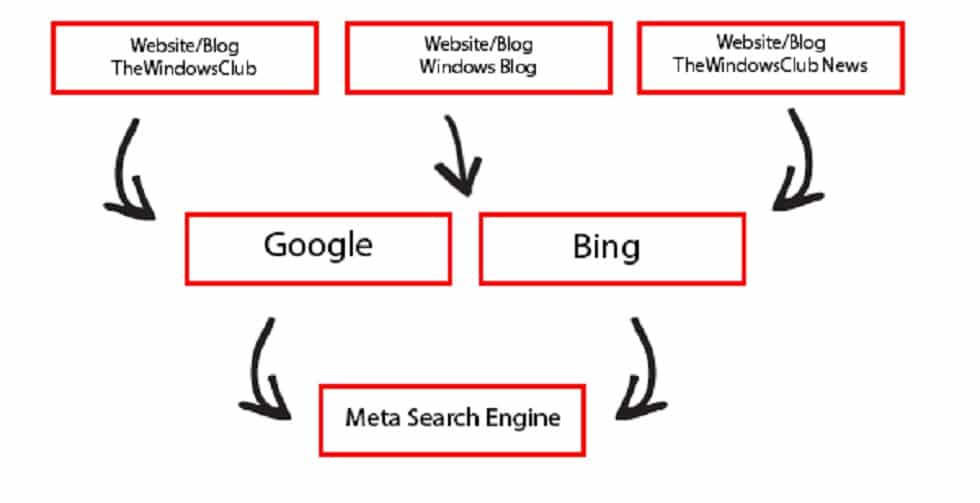What is a Meta-Search Engine and What Caused its Decline?
As things stand today, the meta-search engine isn’t something that usually appears in conversations. Unless of course the topic of discussion is about illegally downloading the next Avengers movie via torrents or finding the cheapest priced holiday. However, this definitely wasn’t the case during the early days of online search, before Google gobbled up almost the whole thing.
Table of Contents
What is a meta-search engine?
A meta-search engine can be defined as an advanced search tool that aggregates the data from numerous other search engines and utilizes that data to compile and display its own search result. It provides users with all the answers they could be looking for elsewhere, all in one place. A meta-search engine used innovative meta-search technology to search through the top search engines of the world wide web such as Google, Yahoo, Bing etc.
Meta-search engines were particularly popular in the early 2000s, but it dates back to the late 90s when engines like Ixquick or Dogpile popped up as alternatives to Yahoo! and Google. However, as of 2019, meta-search engines are pretty much dead and gone, just like social media sites like Myspace, Orkut and hi5 (remember them?).
The sun has definitely set on the prime years of the meta-search engine and most regular users don’t use it. However, the technology of federated searching is still utilized by torrent search engines and travel aggregators. The story of its demise offers insight into today’s market and a valuable lesson about what we, as users, want from search engines.
Why didn’t meta-search engines work?
On paper, the technology seems reasonable and useful:
You get compiled results from several major engines in one place, and you can be sure that you don’t miss out on anything.
You get a quick overview of the answers to your query or dig in and take a closer look at any of them.
All of this while feeling secure and private, as many of the popular meta-search engines would hide the user’s IP address from the queried search engines.
However, there are several challenges meta search systems were bound to address and didn’t manage to fully overcome.
Implementing a scoring system to provide a meaningful response is a huge problem when including data from several major search engines, which might have a completely different relevance score for the same website.
The response time also comes to mind. A meta-search engine tries to always include more and more indices in order to yield a more comprehensive result. However, a likely scenario in that case is the slowing down of the search by one of the indices. Even when a few meta-search engines tried to solve that problem by dynamically loading the results page based on incoming data, the issue of low-quality user experience remained.
The biggest problem, however, is that we don’t care about extensiveness.
Search engines are like fast-food chains – we, the customers, vote on what we do and don’t like by using their services every single day. Our actions are what drives them to continually adjust or go out of business if they fail to do so.
When we search the web, we don’t want thousands of answers to our query – we want the one answer that we were looking for, and on the first page. When we buy, we want the products to appear right away, ready for purchase. Whenever we use a search engine for research purposes, we expect the relevant information to appear in front of us in a matter of seconds. A search on ‘ambush marketing’ will take very long to yield the relevant results via a meta-search engine. On Google, it will display the results in a split second. Google search results also show the related terms which other users have been searching, providing a more holistic experience for the end user.
During their heydays, these were some of the most popular meta-search engines on the world wide web:
MetaCrawler
Dogpile
Mamma
IxQuick
kartOO
Ithaki
Seekz
iBoogie
Zuula
inCrawler
WindSeek
Seek2Day
ez2Find
TurboScout
FinQoo
Polymeta
Unabot
vPinPoint
Draze
SearchSalad
AllPlus
Have all meta-search engines become extinct?
While that’s certainly not the case but the list of existing and relevant meta-search engines in really tiny. The one that remarkably continues to stand against time is the 23 year old Dogpile. DuckDuckGo, launched in 2008, enjoys a steady top 10 position on the market largely thanks to its emphasis on privacy protection, and is expected to continue to grow. Several others, like the previously mentioned eTools.ch, enjoy the status of specialized engines serving netizens with particular needs.
Most, however, either collapsed due to lack of traction or adjusted by changing the nature of their service altogether.
Mamma.com, one of the oldest and most famous meta-search engines during the glory days, has transformed itself to a business review service provider.
Startpage.com, formerly known as IxQuick, now uses the Google database for search and acts as a proxy to protect the users’ privacy.
Is there a future for meta-search?
Several market research results have concluded that as of 2019, meta-search engines have no chance of competing against the giants of the search engine field like Google.
However, while Google remains unchallenged with over 90% market share, customers interested in protecting their online privacy made DuckDuckGo grow rapidly in the past twelve months. The company has managed to double its search volume, reaching 36 million searches a day in 2019. The unexpected and considerable success of a meta-search engine like DuckDuckGo is bound to encourage others to try their hand at it.
On the other hand, alternative privacy options, such as VPNs, can turn potential customers away from metasearch engines promising greater security.
What’s the future of meta-search engines?
The only honest answer to that question is that the future of meta-search engines is unclear. While they will most likely never regain their glory days, they are probably never going to go away for good either. Regardless of what their future holds, meta-search engines have made a remarkably significant contribution in the history of the world wide web. Meta-search engines provided an alternative to the mainstream search engines, and the search service world saw major improvement because of this competition.
No matter what kind of industry you are in, you need to adjust your services to meet the ever changing needs and demands of your customer base. Successfully doing so will ensure a long string of success for your firm while a failure to do so will condemn you to the pages of history as one of the many failed alternatives.


